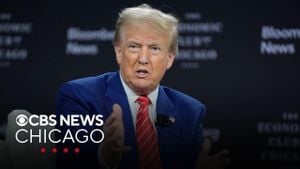OTTAWA — The atmosphere around the Canadian Parliament precinct buzzed with anticipation and anxiety as election results from the United States began to roll in. Every flicker on the screens projected uncertainties not just for America, but for Canada, whose fate is tightly intertwined with its southern neighbor. “There’s a lot of nervous energy in the room tonight,” remarked Gary Keller, formerly Chief of Staff to John Baird, who was the Conservative Foreign Minister. “This one has so much potential impact on our economy, our society.”
On Tuesday, U.S. voters took to the polls to decide between two starkly different visions for their country, choosing either former President Donald Trump or Vice-President Kamala Harris. Both candidates have laid out policies during their campaigns which could disrupt the delicate economic and defense ties with Canada. Trump, aiming for a triumphant return to the White House, has promised to impose a sweeping ten percent tariff across the board, prompting fears from Canadian business leaders. According to the Canadian Chamber of Commerce, this tariff could toll heavily, costing the Canadian economy around $30 billion annually.
The mood of apprehension and concern among Canadians was palpable. Despite being one of just 10 senators who voted against the Canada-U.S.-Mexico Agreement (CUSMA), Harris criticized the deal for not sufficiently protecting American jobs, signaling potential threats to Canadian interests regardless of who wins the presidency. Ensuring readiness for such challenges, the Liberal government has spent months preparing for the upcoming shifts.
Prior to the election results, the federal Liberals emphasized the groundwork laid to navigate relations with the next U.S. administration more adeptly than during Trump's first term, which saw the end of the North American Free Trade Agreement (NAFTA). The government employed what it termed the “Team Canada” approach, consolidifying efforts by premiers, mayors, labor groups, and business leaders to engage with their U.S. counterparts, resulting, to some extent, in the maintenance of valuable market access under CUSMA.
“We have the strongest and, I think, most important relationship as a country with the U.S.,” expressed Foreign Affairs Minister Mélanie Joly. Innovation Minister François-Philippe Champagne echoed this sentiment, branding Canada as a significant strategic partner rather than merely the neighbor to the north. He highlighted, “The focus of our friends in the United States is national security. National security and economic security are one. I think there is a far-reaching recognition today of how our strategic relationship bolsters North America’s security.”
Nevertheless, Rick Tachuk, the head of the American Chamber of Commerce in Canada, pointed out numerous irritants could still spur the U.S. to tighten trade regulations, especially concerning energy, defense, and digital services. “There’s a whole host of issues we need to resolve before we even approach the CUSMA review due in 2026,” Tachuk advised, underlining the importance of the upcoming U.S. Congress's composition on economic policies directed toward Canada.
International perspectives, especially from diplomatic missions, highlighted the importance of monitoring the U.S. elections. Hlynur Gudjonsson, Iceland's ambassador to Canada, expressed admiration for how Canada managed to retain strong trade ties during Trump’s first term. He perceived potential for fruitful relations regardless of Trump or Harris’s victory but remained cautious, particularly on how the U.S. may approach NATO strategic alignments post-election.
Importantly, Trump has consistently faulted NATO allies, including Canada, for failing to meet the target defense spending of two percent of GDP, denoting their failure to pull their weight. Canada estimates it won’t meet this goal until at least 2032. Conversely, Harris underscored her commitment to uphold mutual defense pacts and support for Ukraine, projecting favorable signals for Canadian defense interests.
On another note, Defence Minister Bill Blair stated he believes either administration would acknowledge Canada’s escalated defense spending efforts, citing, “It takes time to develop new battleships and submarines and deliver the aircraft required for modern defense.”
Imported worries from Europe manifested as anxiety spread among diplomats watching the vote totals come through, with remarks indicating European tendencies might lean more favorably toward Harris. “Kamala Harris would be very happy if the Icelanders were voting for her, and I think that's the case for Europe broadly,” Gudjonsson stated.
Back at home, Liberal MP Jean Yip expressed her own trepidation, wishing for the right outcome for both Canadians and Americans. “We just want the best president possible for both Americans and Canadians,” she stated, maintaining hopes for stability regardless of the outcome.
Already, some challenges loom over the future of Canada’s trading relationships. For example, Conservative Leader Pierre Poilievre criticized the governing Liberals’ strategy as inadequate, particularly highlighting the failure to resolve longstanding trade disputes like softwood lumber tariffs. Trudeau countered, reminding constituents of the importance of standing firm during the NAFTA negotiations.
U.S. Ambassador to Canada David Cohen noted optimistically, “I’ve not heard any president, and I certainly haven’t heard either Trump or Harris say they want to dismantle this $3.4 billion-a-day trade relationship.” He asserted there would likely be minimal disruption to trade relations irrespective of the election's outcome, reinforcing how intertwined the economies are. “The Team Canada approach has been effective at nurturing and growing our relationship independent of the presidential election,” Cohen stated, alluding to Canada being the biggest trading partner for 36 U.S. states, hence, fostering millions of jobs across the border.
The stakes remain high as Canada prepares for the election results to ripple through its economy and diplomatic interactions. The careful preparations made over recent months reflect Ottawa’s acute awareness of the inseparability between its own welfare and the dynamics of U.S. politics. No matter what the final tally displays, Canada remains steadfast, maintaining strong ties and strategic engagements with the United States.



